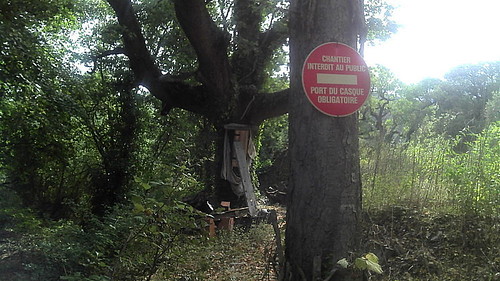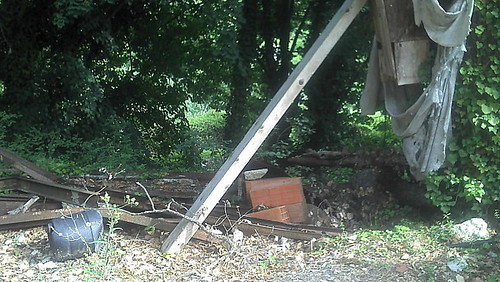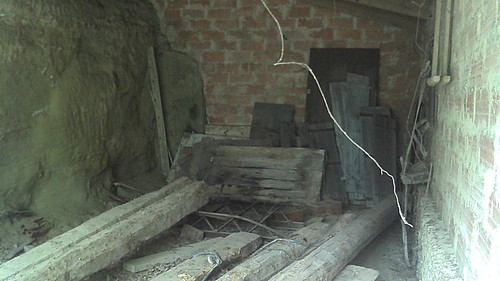In search of a more 'luxuriant' quality of life, à la française
Over more than a couple of decades of living in France, I've regularly come across an assortment of visitors from overseas, seemingly secure in their professional and family lives back home, yet who continually daydream of an idyllic existence in their personal Shangri-Las.
Some throw caution to the winds and gleefully hurdle the fence in search of the long sought-after superior lifestyle - later to find that the grass on the other side, at closer sight, is not as green as they had once hoped. Of these wannabe expats, quite a number opt for the warmer climes of the sunny south of France where the grass, come early summer, is in need of copious quantities of water and much care and attention. How many lush "pelouses anglais" - little green corners of England pictured alongside those idyllic dream homes - eventually end up as dusty, parched, patches of brown?
Every now and again I would bump into a Brit, or an American, perhaps a Dutchman on vacation, whose brief taste of an alternative modus vivendi seems to provoke an immediate transformation from mature, cautious adult, into wet-behind-the-ears ingénue. In conversation, certain prompts – such as “opening a guest house”, “taking a crash course in French”, etc. - trigger my standard response, where I mainly try to highlight the obstacles that lie in wait for the unwary. A few listen; others nod, glassy-eyed, or stare into space dismissively; disasters waiting to happen.
Now that might sound a bit patronising, but I hope it doesn’t come across that way whenever I find myself chatting over a beer with would-be expats. I'm really concerned. My view is that genuine tales of woe and catastrophe, warts ‘n all, based on first-hand knowledge and experience, might occasionally make people sit back, do a double-take. If however they prefer to believe that purveyors of 'doom and gloom' such as yours truly haven’t a clue what they’re talking about, that’s fine too. Their prerogative! But at least I’ve tried. ‘Greenness’ isn’t just about the hue of the grass on the other side of that fence...
Flashback to Provence … 2003
Less than half a mile away from our southern French home (close neighbours in backwater Provencal terms), down in the valley next to the main road, a large delapidated property had been on the market for years; seemingly unsaleable, and for very good reason. Most potential buyers visit properties during holiday periods, and down in Provence this usually meant Easter at the earliest, through to September. Unbeknown to us however, prospective purchasers had turned up during a pleasantly warm and sunny first week of March; the deal was done, and they were away home.
A school inspector, and a head teacher. Erudite, well-travelled, self-assured. A decent, but hardly inexhaustible, retirement nest egg. Impulse buyers of "a property of historical importance with immense potential”, according to the estate agent-ese. Visions of early retirement. However, overconfidence and that reluctance to communicate – the latter sometimes born of an excessive British need to ‘respect’ personal space (ie keep out of mine) – had led them to commit one basic and extremely expensive error (with several more to follow)...
They didn’t know the area, yet all they had to do is ask around, and they would have learnt that our Franco-British family, long-term French residents, lived a short distance up the road. In no time at all, had they called by, they would have discovered precisely why a “propriété d'importance historique avec plein de potentiel” had been up for sale for so long. Provencal valleys, away from the coast, and before the tourists arrive late spring, are peaceful, ‘idyllic’. Sitting on the shady terrace of a beautiful old property during a pre-purchase visit, boiling up water on their camper stove for a cuppa, nothing but the distant gurgling of the Ouveze river to accompany their reverie, and rational thought can go straight out of the blue-shuttered windows. The French sellers were already counting their wads of recently-introduced euros.
Their first mistake? No, not especially the usual underestimation of costs, or over-stretching of limited resources, financial or physical. Nor homesickness for friends or family. Or foolish escapism. Lack of planning and research? Yes, in a way. In this case the problem was, quite simply… noise.
Noise? In a remote foothill of theMont Ventoux in Provence, miles from the nearest village? Surely not. It was so quiet on that morning in early March, you could hear a single flower fall from the surrounding cluster of lime-blossom trees. Contracts were promptly signed, out-of-town architects engaged, and two months later the sale was completed.
I first heard the rumours in the village of Malaucène, sipping my expresso outside the PMU café first thing one morning in early July. News was spreading fast on the local grapevine that some foreign ‘dupes’ had paid a fortune for the place, but perhaps out of deference to my origins, bar talk in my presence omitted to mention that they were Brits. On my way back home carrying warm baguettes, I noticed a car drawn up outside ‘the old ruin’. Curious, I wandered up the drive, to discover a forlorn-looking couple, staring into the valley.
Their dream home was less than 50 metres away from the main Malaucene to Vaison-la-Romaine road. Since Peter Mayle’s “A Year In Provence” had prompted a major shortage in ‘des res’ availability in the next valley on the way to the coast (the Luberon), the Ouveze Valley had become the latest target for foreign property investors, speculators and retirees. The summertime stream of traffic, that once burbled along this forgotten Provencal back road, had swollen into a raging torrent in the space of a decade. Steep valley sides bounced the sound back and forth, vibration from lorries shook the ancient house to its foundations, threatening the integrity of its crumbling walls.
They were desperate. Within twenty-four hours of arriving they were already considering cutting their losses, and selling up. I didn’t have the heart to tell them that the 200,000+ pounds investment they had made was way, way over the real value of the property, and they wouldn’t resell it for half the price.
How could these obviously intelligent people make such a fundamental error? Lack of research, yes, but ably assisted by that rather Anglo Saxon brash superciliousness that does tend to irritate Latin sensibilities! No need to seek out advice from the natives eh, particularly when you come from a successful career background, where the environment tends to fall into place around you. (Little Englander micro settlements are beginning to attract some resentment on the other side of the Channel, where a noisy minority of long-term Brit residents make hardly any effort to adapt to the French way of life. So they are fair game, as the indigenous population sees it!)
All they had to do, on their first visit earlier that year, was ask around. Had they dropped by for a cup of tea at our place just up the hill, rather than brew up on their Camping Gaz, it could have saved them a fortune. Too late now… Still, give them their due – within a week of our first meeting they had decided to hang on in there. Architects re-commissioned, a massive earth-moving project undertaken to ‘sound-proof’ the property, high walls built, the beautiful view hidden. And despite a six foot high earth and rock barrier erected by several JCB's, with the renovation work well under way, at certain times of the day you still had to speak up to make yourself heard over the traffic on the main road!
The next example of misplaced British bulldog attitude wasn't long coming. Despite the deeds clearly indicating the presence of a right of way very close to the property, and our advice that there was nothing whatsoever they could do about it, lawyers were engaged, appeals sent to mayors, regional planners, in fact any French civil servant vaguely involved in such matters (and French civil servants considerably outdo the British both in numbers and pointless ineffectual officialdom). A thick chain and huge padlock put in place on several occasions, in an attempt to barricade the track, was immediately bulldozed out of the way by the local farmers. Lawyers letters were posted, and ignored. Thousands more euros were spent, and eventually wasted. Just as we'd explained to them at the outset. A 300 year-old right of way would never be removed on the say-so of bumptious, inconvenienced Brits.
2006: It had been a while since I was last down in Provence, not since the latter part of the previous year, in fact. Thought I would call in on our near neighbours to see how things were progressing…

Imagine my consternation when I walked up the winding gravel drive, turning the corner where the huge old farm should have loomed large, to see... nothing!
Incredibly the whole edifice had been demolished, razed to the ground. Apparently the restoration work was proving to be far more onerous, both in financial and technical terms, than anticipated. On the (verbal) advice, allegedly (according to locals 'in the know') of their 'maître d'oeuvre' (site foreman), they'd apparently decided to bulldoze the entire place to the ground, and start again from scratch. Overlooking one 'minor' detail…
In France, where buildings on agricultural land are concerned, planning permission is extremely difficult to obtain. Somewhat easier for the farmers of course, but that's the system, and you have to live with it. What you don't do is pre-empt the decision of the DDE (French authorities dealing with planning nationally, as opposed to the local mairie (town hall), and who have to rubber stamp all building projects), and ask for planning permission retrospectively...

Once razed to the ground, the DDE immediately slapped a building prohibition notice on the land. The reply to the request to build an entirely new property in place of the old one, was that by illegally demolishing the building, the owners had caused the land to revert to agricultural use only. Planning permission is illegal for residential properties on agricultural green belt land. For a dwelling of any kind. The application was therefore refused outright!!! The French had no qualms about their rigid stance - and I sympathise to an extent. The property could have been tastefully refurbished. It was of a similar age to our own place, and represented more than a semi-ruin to those families that had lived in the valley for generations. In their eyes, the arrogant English had got their just desserts...
Hate to say it, but... if only they'd asked!!

So for years to follow, there was nothing but a hole in the ground, despite regular new applications for planning permission. Multiple attempts were made by the Brits to persuade the authorities to recant, with each new proposal outdoing the former. The most ridiculous involved a 25 room hotel, with a spa fed by sulphurous water from a local spring (on our land!), a restaurant, swimming pool, gym. But the local mayor, even if only of a glorified village of some 3,000 people, is no country bumpkin. He suspected that the more probable goal was simply to rebuild the main house, and then... what odds such an ambitious and risky project ever being completed?
One of the most expensive fields per square metre you’ll find, then. Probably well over £300,000 spent in total. Empty, except for rusting wire mesh in abandoned foundation trenches, and a crumbling stone wall.
____________
The dénouement... 2011
Over my regular morning expresso in the Malaucène PMU Café du Cours, another snippet of gossip last month. The Brits had finally capitulated. The hole in the ground, plus 2 hectares of adjoining agricultural land, was on the market.
For 10,000 euros, ie roughly 9,000 pounds sterling.
Two local farmers are now fighting over the spoils. With two outbuildings still intact on the land, those with agriculteur status can quite easily get planning permission for conversion to gîtes, or a small villa. A really good deal for the winner, and it's not as if they will be outbidding each other, to the benefit of the Brits. The price remains fixed at 10,000 euros, with the final purchaser decided 'on merit' by the French equivalent of a green belt land commission.

Caveat emptor, would-be expats...












 Stumble It!
Stumble It!
